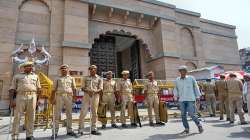'Disappointing and painful!': AIMPLB expresses displeasure over verdict in Gyanvapi mosque case
Gyanvapi mosque verdict: The Varanasi court said the petitioners aren't asking for ownership, but only the right to worship idols that are already located on the outer wall of the Gyanvapi mosque.

Gyanvapi mosque verdict: Expressing displeasure over the Varanasi Court's order given in the Gyanvapi Shrinagar Gauri dispute, the All India Muslim Personal Law Board (AIMPLB) on Monday said that decision was "disappointing and painful".
"The government should strongly protect the 1991 Worship Act otherwise the minority community will be disappointed with justice and will feel that all the doors of justice are closed for them," the board said after a Varanasi Court on Monday dismissed a plea of Anjuman Islamia Masjid committee challenging the maintainability of the suit filed by five Hindu women seeking worshipping rights in the Gyanvapi mosque compound.
While dismissing the pleas, the court said the petitioners aren't asking for ownership, but only the right to worship idols that are already located on the outer wall of the Gyanvapi mosque, close to the Kashi Vishwanath temple.
Notably, Section 3 of the Worship Act 1991 bars the conversion of places of worship. It states, "No person shall convert any place of worship of any religious denomination or any section thereof into a place of worship of a different section of the same religious denomination or of a different religious denomination or any section thereof."
However, as the Varanasi court ruled in favor of the five Hindu women, it said the Places of Worship (Special Provisions) Act, 1991 does not apply in this case. In this case, the devotees are seeking permission for daily worship of the idols they say are already installed there.
District Judge AK Vishvesh delivered the verdict in the Gyanvapi Shrinagar Gauri dispute case and posted the matter for further hearing on September 22. "The court rejected the Muslim side's petition and said the suit is maintainable. The next hearing of the case is on September 22," said Advocate Vishnu Shankar Jain, representing the Hindu side in the Gyanvapi mosque case.
"It's a win for the Hindu community. The next hearing is on Sep 22. It's a foundation stone for the Gyanvapi temple. Appeal to people to maintain peace," said Sohan Lal Arya, petitioner in the Gyanvapi case.
The petition was filed by five women seeking permission for daily worship of Hindu deities whose idols are said to be located on an outer wall of the Gyanvapi mosque, which is located close to Kashi Vishwanath temple.
Following this, a Varanasi court ordered the survey of the mosque complex. Following this, a local Varanasi court ordered a videography survey of the complex in May. The survey work was completed on May 16 and the report was presented in the court on May 19.
(With ANI Inputs)